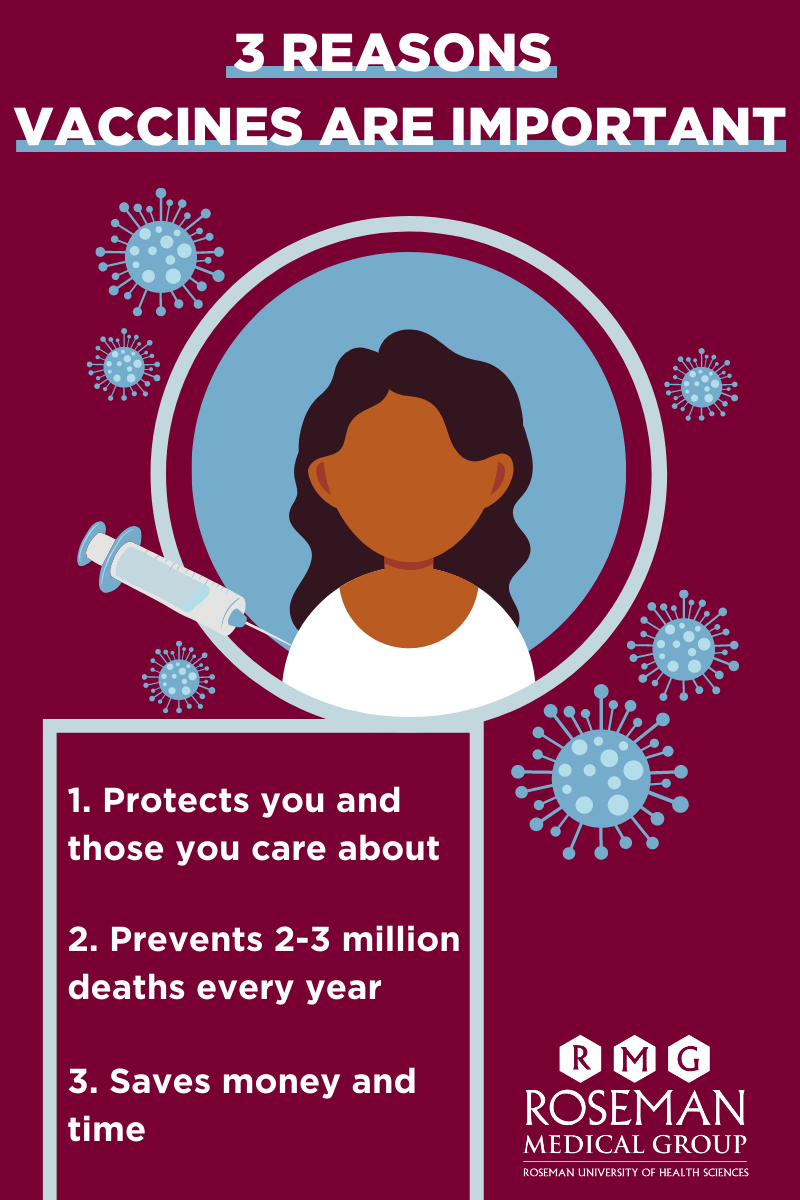Immunizations and vaccines are modern medicine’s greatest success stories, preventing millions of deaths every year. According to World Health Organization (WHO), currently 2-3 million deaths are prevented through immunizations every year. As a cost-effective public health intervention, immunizations protect various age groups from diseases such as shingles, diphtheria, tetanus, pertussis (whooping cough), influenza, and measles.
What are Immunizations and Vaccines?
Immunizations – also known as vaccines – contain a small amount of a weakened virus or bacteria that imitate the virus. In some cases, such as with the COVID-19 vaccines, bits of lab-made protein are used to imitate the virus. Some vaccines only need to be administered once, while others require multiple administrations (boosters) to maintain immunization and sustained protection against disease.
How are Immunizations Administered?
Immunizations are typically administered by injection, but some are given orally or sprayed into the nose. When you receive a vaccine, you’re injected with the weakened form of a disease which triggers your body’s immune response. Your body then develops antibodies. Antibodies are proteins that neutralize or destroy disease-carrying organisms. Should you ever encounter the actual disease-carrying organism after an immunization, your immune system will be prepared to fight the battle.
What are the Types of Immunizations and Vaccines?
There are various types of vaccines. Each one is designed to teach your immune system how to fight off certain kinds of viruses and the diseases with which they are associated. Scientists consider many factors when creating a vaccine. They consider how your immune system responds to the virus, who needs to be vaccinated against the virus, and the best technology or approach to create the vaccine. The various types of vaccines include inactivated; live-attenuated; messenger RNA (mRNA); subunit, recombinant, polysaccharide, and conjugate; toxoid; and viral vector.
Inactivated Vaccines
Inactivated vaccines are those that use a killed version of a virus that causes a specific disease. When a killed version of a virus is used, the vaccine may require several doses over time – also known as booster shots – to provide ongoing immunity against a disease.
Inactivated vaccines fight against:
- Flu (Influenza)
- Hepatitis A
- Polio (Poliomyelitis)
- Rabies
Live-attenuated Vaccines
Live-attenuated vaccines use a weakened form of a virus that causes a specific disease. These types of vaccines create a strong immune response because they are very similar to the natural infection. Most live-attenuated vaccines can provide you a lifetime of protection against a disease with one or two doses.
Live-attenuated vaccines fight against:
- Chickenpox (Varicella)
- Measles, Mumps, and Rubella
- Rotavirus
- Smallpox
- Yellow fever
Messenger RNA (mRNA) Vaccines
mRNA vaccines are the types of vaccines being administered for COVID-19. mRNA vaccines use bits of lab-made protein to teach the cells in your body how to make a spike protein. A spike protein is a small, harmless piece of the virus that activates your body’s adaptive immune system. Unlike traditional vaccines – which can take up to 10-15 years to develop – mRNA vaccines are quickly designed, tested, and mass produced because they do not contain live viruses.
mRNA vaccines fight against:
Subunit, Recombinant, Polysaccharide, and Conjugate Vaccines
Subunit, recombinant, polysaccharide, and conjugate vaccines use either the protein, sugar, or capsid of a virus. These vaccines provide a very strong immune response and can be administered to almost anyone who needs them.
Subunit, recombinant, polysaccharide, and conjugate vaccines fight against:
- Hepatitis B
- Hib (Haemophilus influenzae type b)
- HPV (Human Papillomavirus)
- Meningococcal
- Pneumococcal
- Shingles (Herpes Zoster)
- Whooping Cough (Pertussis)
Toxoid Vaccines
Toxoid vaccines use a toxin made by the virus that causes a specific disease. These types of vaccines create immunity to parts of the virus that cause a disease rather than the whole virus itself. Similar to other types of vaccines, toxoid vaccines may require booster shots to provide ongoing immunity against a disease.
Toxoid vaccines fight against:
- Diphtheria
- Tetanus (Lockjaw)
Viral Vector Vaccines
Viral vector vaccines use a modified version of a dissimilar virus as a vector (carrier of disease) to provide protection. Viruses used as vectors include influenza, vesicular stomatitis virus, measles, and adenovirus.
What are the Most Important Vaccines?
Vaccines are important to your overall health and well-being. They protect you from harmful diseases and prevent the spread of disease to others. Additionally, vaccination is cost-efficient as it helps prevent a disease rather than acquiring considerable costs to treat a disease.
Common infectious diseases such as measles, mumps, and whooping cough have been diminished over the years by way of immunization. Additionally, diseases such as smallpox and polio have been eliminated or are near the brink of eradication.
The American Academy of Pediatrics (AAP) recommends the following vaccinations to help children create immunity to life-threating diseases.
- Chickenpox (Varicella)
- Diphtheria, tetanus, and pertussis (DTaP)
- Hepatitis A (HepA)
- Hepatitis B (HepB)
- Hib
- Human papillomavirus (HPV)
- Influenza
- Measles, mumps, and rubella (MMR)
- Meningococcal
- Pneumococcal
- Polio (IPV)
- Rotavirus
Visit the Centers for Disease Control and Prevention (CDC) for immunization schedules and talk to your healthcare provider or child’s pediatrician to discuss which vaccines may be right for you and your family.

Need updated vaccinations or have questions? Roseman Medical Group is here to help. Our healthcare providers provide quality, empathic, and patient-centered care for your overall health and well-being. Contact us at 702-463-4040 to schedule an appointment.
Article by Kristine Campo


